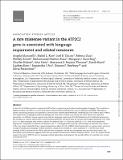A rare missense variant in the ATP2C2 gene is associated with language impairment and related measures
Abstract
At least 5% of children present unexpected difficulties in expressing and understanding spoken language. This condition is highly heritable and often co-occurs with other neurodevelopmental disorders such as dyslexia and ADHD. Through an exome sequencing analysis, we identified a rare missense variant (chr16:84405221, GRCh38.p12) in the ATP2C2 gene. ATP2C2 was implicated in language disorders by linkage and association studies, and exactly the same variant was reported previously in a different exome sequencing study for language impairment (LI). We followed up this finding by genotyping the mutation in cohorts selected for LI and comorbid disorders. We found that the variant had a higher frequency in LI cases (1.8%, N = 360) compared to cohorts selected for dyslexia (0.8%, N = 520) and ADHD (0.7%, N = 150), which presented frequencies comparable to reference databases (0.9%, N = 24 046 gnomAD controls). Additionally, we observed that carriers of the rare variant identified from a general population cohort (N = 42, ALSPAC cohort) presented, as a group, lower scores on a range of reading and language-related measures compared to controls (N = 1825; minimum p = 0.002 for nonword reading). ATP2C2 encodes for an ATPase (SPCA2) that transports calcium and manganese ions into the Golgi lumen. Our functional characterization suggested that the rare variant influences the ATPase activity of SPCA2. Thus, our results further support the role of ATP2C2 locus in language-related phenotypes and pinpoint the possible effects of a specific rare variant at molecular level.
Citation
Martinelli , A , Rice , M , Talcott , J B , Diaz , R , Smith , S , Hashim Raza , M , Snowling , M J , Hulme , C , Stein , J , Hayiou-Thomas , M E , Hawi , Z , Kent , L , Pitt , S J , Newbury , D F & Paracchini , S 2021 , ' A rare missense variant in the ATP2C2 gene is associated with language impairment and related measures ' , Human Molecular Genetics , vol. 30 , no. 12 , ddab111 , pp. 1160–1171 . https://doi.org/10.1093/hmg/ddab111
Publication
Human Molecular Genetics
Status
Peer reviewed
ISSN
0964-6906Type
Journal article
Description
SP is funded by the Royal Society. This work was supported by an Action Medical Research Action/The Chief Scientist Office (CSO), Scotland grant (GN2614) and a Cunningham Trust grant to SP and SJP. Support to the analysis was provided by the St Andrews Bioinformatics Unit funded by the Wellcome Trust [grant 105621/Z/14/Z]. Assessment of the Aston cohort was supported by funding from The Waterloo Foundation to JBT and SP [797–1720]. Analysis of the discovery pedigree was supported by the University of Kansas grant (NIH:NIDCD 5 R01 DC001803). Analysis of the York cohort was funded by Wellcome Trust Programme Grant 082036/B/07/Z. DFN is currently supported by Oxford Brookes University funds, the Leverhulme Trust and the British Academy. This work was, in part, completed while DFN was at the Wellcome Trust Centre for Human Genetics, Oxford as an MRC Career Development Fellow (G1000569/1). We would like to thank the members of all teams who collected the data and the families who participated.Collections
Items in the St Andrews Research Repository are protected by copyright, with all rights reserved, unless otherwise indicated.

